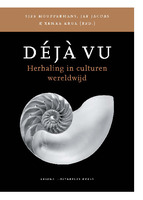Déjà Vu
Herhaling in culturen wereldwijd
Author(s)
Houppermans, Sjef
Jacobs, Jef
Kruk, Remke
Collection
OAPEN-NLLanguage
Dutch; FlemishAbstract
Repetition has a major role in human culture. In lullabies and prayers, in protests and war
cries: from the cradle to the grave, repetition
is the companion to life’s essentials. In a
constantly revolving world there is no pure
repetition. Events never repeat themselves
precisely. This is equally true of repetition
in Literature and Art, where the use of
repetition is varied and frequent. How does
repetition work? And how can it be of use?
Déjà Vu unravels these questions in fifteen
chapters ranging from film remakes and
Baudelaire to the offer of Abraham and David
Lodge, Small World. Déjà Vu shows that
repetition has been used worldwide through
all times and cultures in visual arts, poetry,
music, literature and motion pictures. Herhaling speelt een centrale rol in menselijke cultuuruitingen. Slaap - liedjes en smeekbeden, protesten en strijdkreten: van de wieg tot het graf begeleidt de herhaling de essentiële gebeurtenissen in het leven. Maar in een wereld die zelf voortdurend in beweging is, kan van zuivere herhaling geen sprake zijn. Je kunt onmogelijk tweemaal in dezelfde rivier stappen. Dat geldt ook in literatuur en kunst, waar herhaling veelvuldig wordt ingezet als artistiek middel. Daarbij is juist het verschil van essentieel belang. Maar wat is precies de aard van dat verschil? Wat ‘doet’ herhaling als kunstgreep met het werk? En hoe kan herhaling worden ingezet om gevestigde belangen en opvattingen te consolideren of juist te onder mijnen? Déjà Vu behandelt deze vragen vanuit een interdisciplinair en mondiaal perspectief en laat daarbij zien hoe het middel van de herhaling door alle tijden en alle culturen wordt toegepast in beeldende kunst, muziek, literatuur en film.
Keywords
repetitionDOI
10.26530/OAPEN_606231ISBN
9789087281465OCN
782878254Publisher
Leiden University PressPublisher website
https://www.lup.nl/Publication date and place
2011Series
LUP Academic,Classification
The arts: general topics


 Download
Download Web Shop
Web Shop